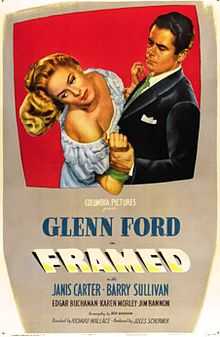Framed (1947 film)
| Framed | |
|---|---|
 Theatrical release poster | |
| Directed by | Richard Wallace |
| Produced by | Jules Schermer |
| Screenplay by | Ben Maddow |
| Story by | John Patrick |
| Starring |
Glenn Ford Janis Carter |
| Music by |
Marlin Skiles Arthur Morton |
| Cinematography | Burnett Guffey |
| Editing by | Richard Fantl |
| Distributed by | Columbia Pictures |
| Release dates |
|
| Running time | 82 minutes |
| Country | United States |
| Language | English |
Framed is a 1947 black-and-white film noir directed by Richard Wallace and featuring Glenn Ford, Janis Carter, Barry Sullivan and Edgar Buchanan. The B movie is generally praised by critics as an effective crime thriller despite its low budget.[1]
Plot
Mike Lambert takes to driving a truck when he falls on hard times. When his rig brakes stop working in a small town he meets Paula Craig (Janis Carter) at the La Paloma Cafe and is quickly drawn into a criminal plot devised by the seductive femme fatale.
Paula talks her boyfriend, Stephen, into robbing the bank that he manages. The two then drug Mike, intending to frame him for the crime. Paula then kills Stephen and takes all of the stolen cash. She then tells Mike that he is the one who killed Stephen in a drunken rage and that she has covered up for him, thereby implicating herself. She begs him to run away with her. Mike considers her offer until he learns that his close friend Jeff has been accused of the killing—and that Paula intends to pin the robbery that Stephen committed on his friend.
Cast
- Glenn Ford as Mike Lambert
- Janis Carter as Paula Craig
- Barry Sullivan as Steve Price
- Edgar Buchanan as Jeff Cunningham
- Karen Morley as Beth
- Jim Bannon as Jack Woodworth
- Sid Tomack as Bartender
- Barbara Woodell as Jane Woodworth
- Paul E. Burns as Sandy, Assayer
Reception
Critical response
Critic Mark Deming called the film, "[a] superior low-budget film noir."[2]
Film critic Dennis Schwartz liked the film and wrote, "Janis Craig gives a very sexy and dangerous performance, which plays off very well against Glenn Ford's very earnest one of the good guys who can't get a lucky break. Even when he finds someone he could love she turns out to be poison, someone who was about to poison his coffee until she was reassured that he does not know something incriminating about her role in the crime. It was an entertaining B-film that ably caught how an honest but [a] desperate man reacts after hooking up with a falsehearted woman. The good performances overcame the cheap production values and slight story."[3]
Noir analysis
Film critic Hans J. Wollstein wrote, "These silly censorship rules aside, Framed remains a thrilling example of 1940s film noir at its best: economically told, atmospherically photographed (at, among other places, Lake Arrowhead) and more than competently acted. Carter, especially, is a revelation and it is too bad that she was mostly used by Columbia Pictures for decorative purposes, a sort of second-tier Rita Hayworth."[4]
References
- ↑ Framed at the American Film Institute Catalog.
- ↑ Deming, Mark. Framed at allmovie.
- ↑ Schwartz, Dennis. Ozus' World Movie Reviews, film review, September 20, 2001. Accessed: August 4, 2013.
- ↑ Wollstein, Hans J. Allmovie by Rovi, film review, no date. Accessed: August 4, 2013.
External links
- Framed at the American Film Institute Catalog
- Framed at the Internet Movie Database
- Framed at allmovie
- Framed at the TCM Movie Database
- Framed film clip at YouTube
| |||||